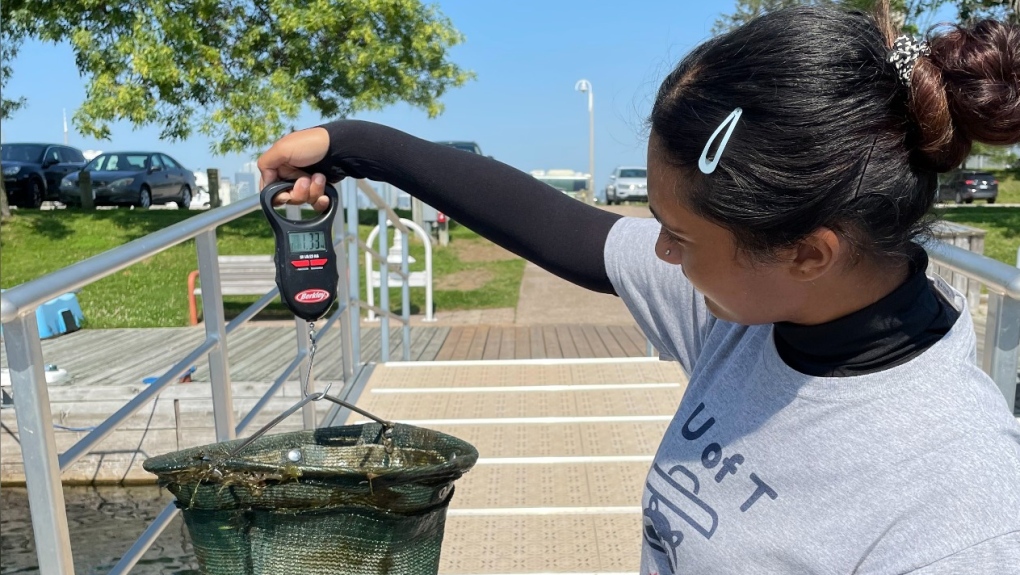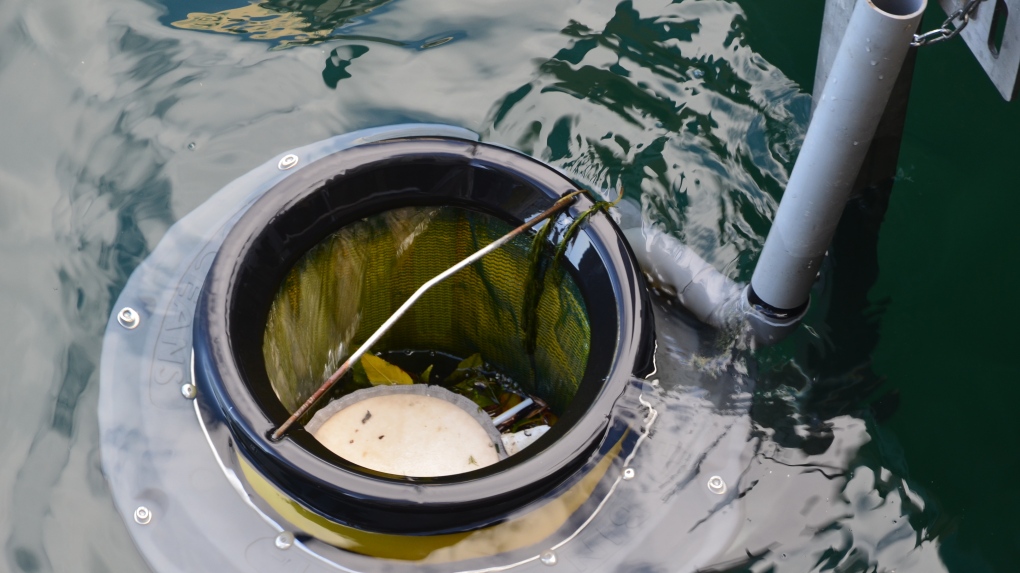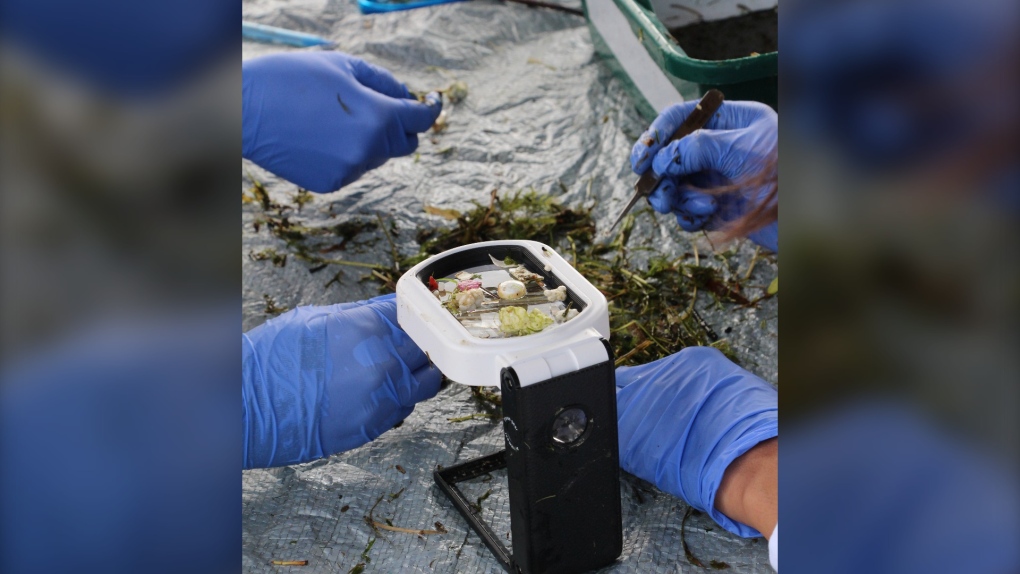Toronto 'Trash Team' reveals top 10 large items found in Lake Ontario
 A member of U of T's Trash Team collects a seabin from Lake Ontario. (Photo provided by University of Toronto)
A member of U of T's Trash Team collects a seabin from Lake Ontario. (Photo provided by University of Toronto)
A large amount of plastic—the equivalent of about 3,400 plastic water bottles in volume—were found in Lake Ontario during a four-month period last year by a Toronto “Trash Team.”
The University of Toronto group, made up of students, researchers, volunteers and staff, recently revealed the top 10 large items that were found by their seabins in 2021.
A seabin is a floating garbage can that collects waste by gently pumping water through a mesh bag, creating a vacuum that sucks items inside. Chelsea Rochman, the lead of Rochman Lab and the program’s lead for scientific programming, told CTV News Toronto on Monday there were seven seabins placed in Lake Ontario near Toronto throughout the boating season.

The bins are active at various points between May and October and Rochman said that an extrapolation of their data shows they collected an estimated 33 kilograms of plastic pollution.
“That sounds light, but that’s actually the equivalent of about 3,400 plastic bottles in volume,” she said. “And from a microplastics side, we would collect more than 230,000 small pieces of plastic pollution.”
In terms of large items collected, the top offenders appear to be plastic film, plastic fragments and bottle caps, in addition to smoking materials such as cigarette butts and cigar tips. Also among the list are single-use plastics such as food packages and stir sticks.
Foam was also listed among the top five items found in Lake Ontario—but Rochman said the type of foam was surprising.
“I think when a lot of people think about foam litter or Styrofoam, they think about the takeout containers,” she said. “And don't get me wrong, we find that material in the environment. But we are finding that about half of the foam we find has a different look and feel and shape and color. And it seems that a lot of this material is coming from construction sites.”
Rochman added that kind the foam was often yellow, blue or pink in colour. An analysis of the substance found elements of bromine, a signature of flame retardant used in insolation materials.
“Picture somebody putting insulation on a roof or the side of the side of a building, they're cutting it, sometimes they're sanding it in order to get it to be smooth, and you almost have like the snow or little bits of Styrofoam falling off.”

“It's something that we didn't think about until our seabins.”
Of the smaller items collected by the U of T Trash Team, about 32 per cent have been identified as foam.
An analysis of the data found that between 40 and 60 per cent of the foam collected last year were likely from construction sites.
“That really surprised us actually.”
Following two seasons in which COVID-19 impacted the number of seabins in Lake Ontario, Rochman hopes to get more traps into the water this year. The team also hopes to place seabins in waterways near facilities that are used for plastic production to see if it will reduce the volume of pellets found in Lake Ontario.
The goal, Rochman said, is to increase waste literacy and help support solutions so there is less pollution in Ontario’s water.
In March 2021, the team started an international trash trap network, where data is shared across North America, with outposts in Vancouver, North Carolina and Florida. Rochman said she hopes to expand the network this year beyond the 40 locations that have already started to collect data.
CTVNews.ca Top Stories

BREAKING Boissonnault out of cabinet to 'focus on clearing the allegations made against him,' Trudeau announces
Prime Minister Justin Trudeau has announced embattled minister Randy Boissonnault is out of cabinet.
Families of Paul Bernardo's victims not allowed to attend parole hearing in person, lawyer says
The families of the victims of Paul Bernardo have been barred from attending the serial killer’s upcoming parole hearing in person, according to the lawyer representing the loved ones of Kristen French and Leslie Mahaffy.
Baby dies after being reported missing in midtown Toronto: police
A four-month-old baby is dead after what Toronto police are calling a 'suspicious incident' at a Midtown apartment building on Wednesday afternoon.
'They squandered 10 years of opportunity': Canada Post strike exposes longtime problems, expert says
Canada Post is at ‘death's door’ and won't survive if it doesn't dramatically transform its business, a professor who has studied the Crown corporation is warning as the postal workers' national strike drags on.
Sask. woman who refused to provide breath sample did not break the law, court finds
A Saskatchewan woman who refused to provide a breath sample after being stopped by police in Regina did not break the law – as the officer's request was deemed not lawful given the circumstances.
'Bomb cyclone' batters B.C. coast with hurricane-force winds, downing trees onto roads and vehicles
Massive trees toppled onto roads, power lines and parked cars as hurricane-force winds battered the B.C. coast overnight during an intense “bomb cyclone” weather event.
Ford says there is 'clear consensus' among premiers for separate trade deal with Mexico
Ontario Premier Doug Ford says there is 'clear consensus' among premiers for separate bilateral trade deals with the U.S. and Mexico, following a phone call with all the leaders on Wednesday.
EV battery manufacturer Northvolt faces major roadblocks
Swedish electric vehicle battery manufacturer Northvolt is fighting for its survival as Canadian taxpayer money and pension fund investments hang in the balance.
Canada closes embassy in Ukraine after U.S. receives information on 'potential significant air attack'
The Embassy of Canada to Ukraine, located in Kyiv, has temporarily suspended in-person services after U.S. officials there warned they'd received information about a 'potential significant air attack,' cautioning citizens to shelter in place if they hear an air alert.
































